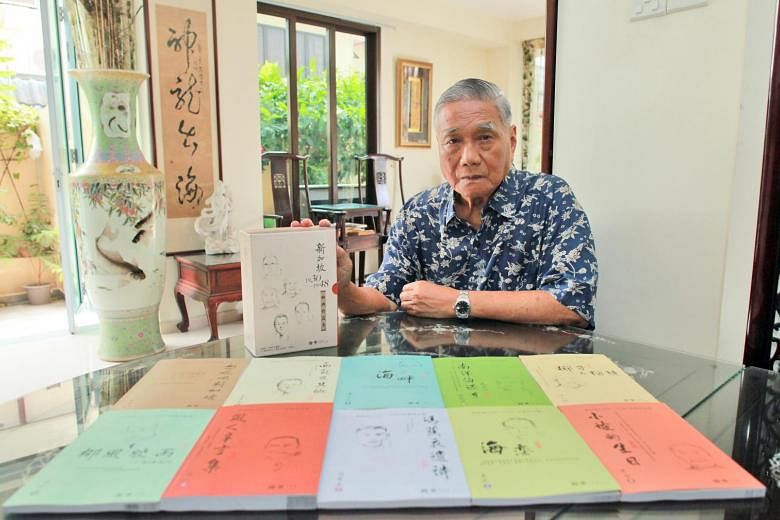Singapore figures in many literary works by Chinese authors, playwrights and poets from the early 20th century, but most of the works have been out of print for decades.
Thanks to a labour of love by retired school principal and writer Yap Koon Chan, 80, a collection of 10 lost works by writers who visited, worked or lived in Singapore has been published.
The 10 volumes comprise short stories, poems, plays, essays and a collection of newspaper columns published between 1930 and 1948. All contain references to Singapore as most were written here.
Among them is a 1934 book of short stories describing Singapore through the eyes of children, titled Xiao Po De Sheng Ri, or Xiaopo's Birthday, by Lao She (1899-1966). The writer, who taught Chinese briefly at the then Chinese High School from 1929 to 1930, is best known for his play Teahouse.
A collection of poems titled Hai Pan, or Seashore, by Tan Yunshan (1901-1983) published in 1930, describes the beautiful seafront in Tanjong Pagar and Clifford Pier in the 1920s.
Other writers, mostly unknown even to Chinese-language readers today, describe Singapore in the days when it was a British colony, reflecting the lives of people in a multi-racial society and commenting on issues of the day.
Six of the works were first published in China, two in Singapore and two in colonial Malaya.
Yap, who is better known by his pen name Luo Ming, is the founder and immediate past president of the Singapore Literature Society, which has been promoting local Chinese literature since 1980.
He obtained support from the SG50 Fund and the Wee Foundation to reprint the lost books.
The 10 books as well as his latest collection of essays titled Ji Yi Qie Liu Zhu, or Keeping Memories, will be launched at the National Library Board (NLB) main building in Victoria Street at 2pm today.
He told Life that he became interested in early Chinese writings in Singapore more than 15 years ago.
"That was when NLB and my society collaborated on a project to do research on Chinese writers who came to Singapore and Malaya from the 1900s until Singapore's independence in 1965," he said.
The project resulted in the publication of a book in 2003 documenting details of almost 200 Chinese writers who came here and wrote about Singapore during that period.
"Their works were in the thousands, but very few of those published in the early 1900s can be found today," he said.
Mr Yap, who was in the pioneering batch of graduates from the former Nanyang University in 1959, taught at Chung Cheng High School before becoming principal of Catholic High School from 1974 to 1983.
He has spent the last 15 years looking for the missing books by writers from the early 20th century and the quest took him to public libraries and the homes of the writers' descendants in China and other parts of South-east Asia.
"I am happy I found the 10 volumes, all with references to Singapore, with the help of friends, especially those in China," he said.
Minister of State (Culture, Community and Youth) Sam Tan, who will be at today's book launch, praised Yap for the effort he made to find and reprint the books.
"They give us a glimpse into what Singapore was like in the early years and they enriched the history of Chinese literary writing here, which is an important aspect of Singapore heritage as well," he said.
One thousand sets of the books have been printed.
They will not go on sale, but will be distributed free to schools and tertiary institutions, public libraries and Chinese community groups and societies here.
Mr Yap is not ready to stop. He is already thinking of reprinting more of the early Chinese works he has uncovered over the years.
"If I have the funds, I may consider republishing the next 10 volumes from 1949 to Singapore's independence in 1965," he said with a laugh, hinting that more support will be welcome.

